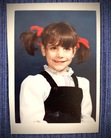Vanessa Shields's Blog, page 5
April 1, 2025
What It Feels Like To Get Published – Part I
Herein lies the third instalment of blogs I’m writing about being a writer. The first, what it feels like to have a writing idea; the second, what it feels like to finish a writing project; and now, what it feels like to get published.
This is a LONG post that is so long, I’ve split it in two! But this one is long on it’s own. Just a heads up. 
My first poem that was published was a piece entitled ‘Spring’, and it was published in The Windsor Star newspaper (remember those?). I won third place in their annual spring poetry contest. I was twelve years old.
I remember feeling scared to submit, but I did it anyway. I remember hand-writing the piece on a paper and snail-mailing it in to The Windsor Star. I remember the constant pull of wonder if I would place or be published at all, like extra strands of ligaments in my legs…constantly twitching (these literary ligaments still exist today!). I remember feeling the weight of the piece ‘being out there in the world’ outside of me, still, actually, very much in my body, as I awaited the results of someone’s judgements.
Submitting something you’ve written is a mighty feat. In and of itself, the ‘act’ of releasing the piece into the eyes, heart, mind and body of another person to judge takes courage. This is a fact that I stand by wholeheartedly.
It takes courage to ‘submit’ – which, in the true sense of the word’s meaning – is a surrendering to the release of the thing, and a conscious awareness of what it is to put that thing in someone else’s control/power/judgement, and await the subsequent consequences of that judgement.
I wanted to win the poetry writing contest I’d submitted to. I wanted to place first. I remember feeling that rush of heated confidence that the writing was good enough to take the win…but it was fleeting. As time passed, that confidence melted away and slipped out my toes, and the swell of insecurity swooped into my mind like a flock of hungry vultures.
Sometimes what happens after I submit a piece, (then and now) after the courage it takes to do the submitting subsides, melts, disappears, I experience a numbing. Voices in my head convince me that the piece is ‘not good’ and ‘don’t have any expectations’ and ‘forget about it’…I think it’s a process I’ve built into my creative life so to soften the blow when a rejection comes in.
I can fill an entire house with rejections, forget about a wall.
So, my body has, over the decades of submitting, created some habits to help deal with the outcomes of the releases of my writing into the hands of those who will publish it or not. I feel heat, anxiety, nausea, excitement, hope, yearning and desperation when I submit something I’ve written, and/or when I post it on my blog.
The waiting for the results of the submission can be excruciating. When I was twelve, it was pretty excruciating. And then, I received a letter in the mail with a positive response! An acceptance of the piece with a third place prize, publication of the poem in The Windsor Star, AND I was invited to an awards ceremony at the Windsor Public Library, main branch. That gorgeous building bathed in so many shades of brown, where I’d gone up the down escalators, watched puppet shows, and frolicked about in the joy of library visits, was like a church to me. It was amazing to get to go there to receive an award for my first published piece…it made it more ‘real’ or ‘professional’ that there was a ceremony in a location I revered.
But how did it feel? Well, I was terrified to attend the award ceremony. I was asked if I would read my piece, to which I responded in the affirmative, even though I was terrified. And, I felt a pang (or five) of sadness that I didn’t win first prize. I was curious about who’d won, and I wanted to hear their pieces…to compare. Because, goddess, the Compare Monster had taken residence in my spine already.
I felt joy but it was conditional. Muted. A kind-of cautious mistress who kept grabbing at her chin with worry because she didn’t truly feel like it was real, like she belonged. Not an imposter, as I’ve heard many creatives use a way to explain their feelings about their work, but someone who was invited to the party but didn’t really know how to ‘be’ at the party. I knew in my head that it was an achievement to win third place, to get my writing published in a newspaper. I knew my mom was proud because she said so. I knew my teachers were excited, because they said so…but it was like…despite the lived reality of what I was experiencing, the penetration of the success in my body…was limited. The feeling of ‘joy’ in my heart was there but…cautious. It quickly became layered with voices of (nasty? hopeful? afraid? elated?) parts of me that measured this brand new, inaugural success of publication, tallied it as not-quite-a-win, and pressured my creativity to ‘make’ more and see if I could have ‘real’ success as a first-place winner.
As I write this, I feel both…embarrassed and awed at what I’m uncovering/discovering when I ask myself what it ‘feels’ like to be published. There are so many external and internal contexts to consider in order to answer it fully!
The meaning of ‘published, I believe, needs to be acknowledged and agreed upon in order to help with the how-it-feels explanation.
What does ‘published’ actually mean?If the process is: a) write something b) submit it to 1) a traditional form of publication, ie: magazine, journal, news outlet, traditional publisher, c) get accepted, d) the piece is then ‘published’ – this is one scenario.
I didn’t get paid when my poem was published in the newspaper, but it was published in the newspaper, so it ‘counted’. How we label what is published, where it is published, and whether or not we get paid if it gets published is a slippery snakes-and-ladders kinda landscape currently.
If the process is a) write something b) submit it to 2) a digital format publication (examples: a blog, an on-line community/website, etc.), c) get accepted, d) the piece is ‘published’ in a form that may or may not be ‘deemed’ a traditional place recognized for publication, and therefore ‘less’ than said ‘traditional’ places for publication. Is this the same ‘published’ meaning? It begins to get very complicated…very hairy in these waters. Who decides what is ‘professional’? Does one have to be paid in order for their work to be ‘professional’? What about how long you’ve been doing the art? How many places have shared/published/supported the work? Who decides what is ‘traditional’ or not? And why?
But wait, there is still another process to acknowledge: 3) self-publication. You still a) write something – but everything is different after this. There is no ‘submitting’. There is editing (Please, let there be editing!), and everything else you do on your own (or hire it out). You pay for it, you get the result of a digital or hard-copy piece of writing or both. You write a poem, you ‘publish’ it on your blog. People read it. The ‘actions’ are the same…even the people involved in the process could be the same (ex. you hire a freelance editor to edit your book, and she also edits for a traditional publisher), but the…gravitas/prestige…or the measured levels of success…are different. It can feel like it’s better to be traditionally published because of its place in the history of measuring a writer’s ‘success’ in this way.
For me, how it ‘feels’ to get a poem accepted into a Canadian literary magazine like ARC Poetry or Geist is different than how it feels to publish a poem on my blog. In both cases, the writing happens, there is no money received (sometimes – even this gets wishy-washy as some traditional publications pay, whilst others don’t; and some blogs like those on Substack or Patreon or even personal websites can generate money for the writer…ahem, does this ‘count’ as ‘professional’ if you ‘buy a writer a coffee’/donate/pay for their blog?); and the outcome of people reading the poem happens. One could argue that both instances here equal ‘publication’. But the socially agreed upon level of achievement is different.
All this said, if a self-published book or poem makes money, like, a lot of money, the traditional book publishers pay attention, and the writer can ladder-up into this realm of publishing. Money also plays a role in this ‘what it feels like to get published’ world I’m writing about. But…let’s wait on this part…
Another example of what ‘published’ means is evident in the granting system. To apply for most (if not all!) writing grants, you need to show that you’ve been a) paid for the work that’s been published, and/or b) have had a book traditionally published, and/or c) have had a form of the writing published as in spoken word poetry, and/or d) if you’ve self-published, I believe, a certain amount of printed books/e-sales have to have been achieved in order to ‘show’ success. There are designated ways that a writer must ‘show’ her publication history. These…definitions of ‘published’, I believe, affect the way it feels when something gets published. If you can’t apply for grant with the writing you’ve published in the ways you’ve published it that doesn’t match the eligibility guidelines, does that make the writing ‘less’?
When I joined the League of Canadian Poets and The Writers’ Union of Canada ten-plus years ago, self-published authors were not recognized as ‘published’ writers. However, this is changed now, with eligibility guidelines shifting to embrace the current reality of the publishing industry and social media. Still, sometimes it can feel like applying for a bank loan: you have to show that you have a chunk of money saved before they give you the loan…but if you had the money saved, you wouldn’t necessarily need the loan at all. Snakes-and-ladders, my friends.
Oof. You’ve made it this far! Thank you! I think that’s more than enough for today! Stay tuned for Part II!
Here’s a bit of a poem I wrote in 2021…it kinda speaks to how it feels to be rejected…to be someone who desires to be published…and who is deciphering in her head and heart that actually means…and feels like…

March 23, 2025
Marketing Work (aka editing resistance!)
I’ve been having gargantuan resistance when it comes to getting back into edits for my YA novel. Gah! Like…soooo much resistance. I’m attributing it to several things: a) body and mind recovery post a big life change, b) the end of a dreary and cold-as-balls winter c) too many good books to read and d) desire to sleep (it’s my favourite!).
Finally, last week, I opened up the big file in Scrivener and did a little peruse of the mighty project. Everyone was there – all the characters, their scenes, developments…and all the edits awaiting my nimble fingers. But I couldn’t actually edit. So, I decided to start working on some marketing ideas that I’m planning on making go ‘live’ when I start submitting the book for publication and/or getting an agent. You know, to create buzz and maybe get some pre-sales, or maybe even sell some of the ‘bonus’ book…(see below)
See, there’s a character in the book who is a famous writer, so my plan is to create a website for her, complete will all her books (there are 25! Yes, this also means that I made up 25 novel ideas…that maybe one day I can actually use and write the novels!)), a bio, press, and other goodies that show her writing career. As well, I’m hoping to have a ‘bonus’ book that readers can purchase…essentially it’s the writer’s book that she wrote in the novel…but that is actually ‘real’ and readers can buy it as well as the novel!
I took to creating book covers for each of the writer’s books. She started being published in the late 1970s, and subsequently published a new novel about every two years after that. I did a bunch of research on book covers and fonts from the 1970s-80s, so I could create covers for the first bunch of books that would look like they were actually published in that time frame.
Here’s a teaser…
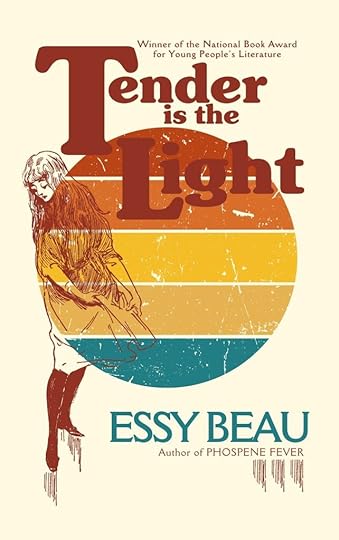
This is the author’s third book, published in 1981. This book catapulted her into Judy Blume status! Oh, I’m having so much fun creating book covers!
I’ve got six book covers drafted…19 more to go! I plan on putting them all on the website I make. It’s gonna be great!
This has nothing to do with edits that *need* to get done, but it’s still in the realm of the novel…thinking about and planning for and starting the major marketing plan I have. No matter if I get an agent or a traditional publisher or if I self-pub – marketing is essential, and I love it! (Most of it! I adore a stellar website…and I’m resisting the other socials…but I know I have to decide whether to jump back in or not…at some point. Not now!)
The take-away here? There is always the ‘business’ of writing to work on! Take to Canva or Wix, Envato or your phone to begin creating marketing tools that will help get readers reading – or in the least – curious about what you’re putting into the world!
March 22, 2025
All Lit Up – Industry Articles x 3
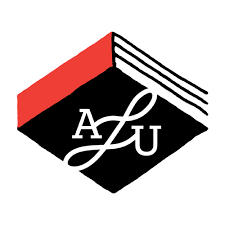
Have you heard of All Lit Up? If not, please, let me introduce you! All Lit Up is a hub for Canadian Literature:
On All Lit Up, readers of emerging, quirky, and unabashedly Canadian literature can find and purchase the best books this country’s independent publishers have to offer. Curious readers can also browse through our exclusive behind-the-scenes content about the books, authors, and publishers whose work is available on our site.
Additionally, All Lit Up serves as a community bookstore for readers with no local option, ensuring every Canadian has access to the literature produced by Canadian independent publishers.
I have had the opportunity work with the ALU team on various occasions, including writing articles for their on-line content! Most recently, I wrote a three-part series on book marketing.
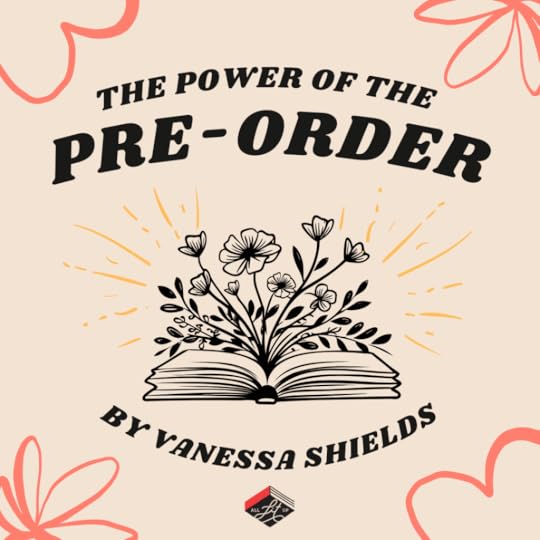
Part One: The Power of the Pre-Order – click here to read!
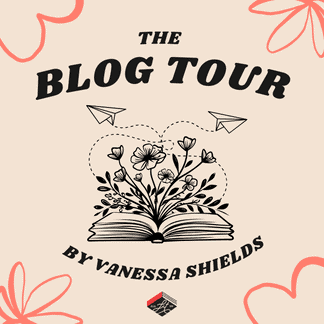
Part Two: The Blog Tour – click here to read!
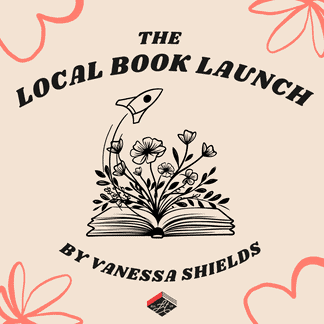
Part Three: The Local Book Launch – click here to read!
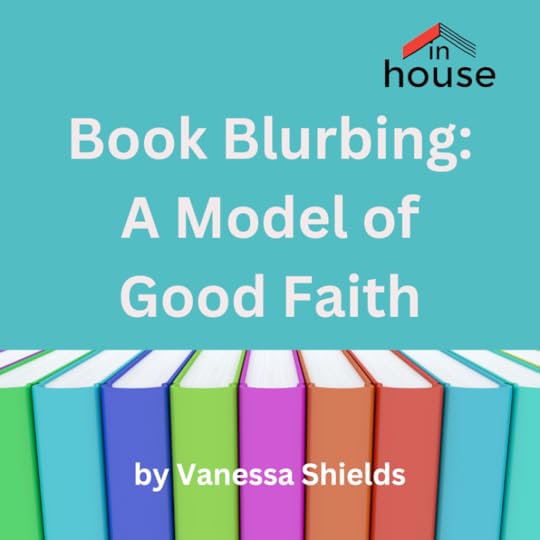
I also had the opportunity to write this piece on Book Blurbing…which seems to be on the potential chopping block with some of the Big Five publishers. I think it’s an important part of the process!
Book Blurbing: A Model of Good Faith – click here to read!
Thank you, Mandy! (She’s my editor at ALU!) I hope you enjoy All Lit Up!
March 19, 2025
Keep Singing
Lately, I’ve been making sure that if I park and there’s a good song on the radio, I stay in the car and keep singing it. Loud and wild.
I’m an avid seat-dancer from way back, so when I good song comes on, I like to shake it and twist it and shimmy it whilst in the driver’s seat. Sometimes, I like to move the rearview mirror so I can see my lips, and I’ll pretend I’m the singer and I’m lip-synching in a music video.
I don’t always enjoy listening to music when I’m in the shower, but when I do, I sing loudly and dance in there too. Music is a salve. And with all the wounds in the world at this time…with all the wound-makers and wound-cultivators…sometimes, it’s all I can do to not sob-sob-sobbity-sob but keep singing.
Short post, that I hope, will last as you move through your busy days.
Keep singing. Finish the song out loud and wild.
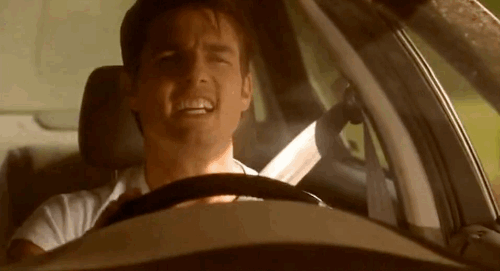
March 17, 2025
What It Feels Like to Finish a Writing Project
 Journal entry upon finishing writing my latest novel. October 2024THE FINISHING FEELINGS
Journal entry upon finishing writing my latest novel. October 2024THE FINISHING FEELINGSIt really is something, the feelings I get when a writing project is finished. That said, I’m sure there are many of you who have that feeling that a piece of writing is never really finished! I have that feeling too! Especially with poetry. Depending on the size and scope of the writing project, the feelings of completion can vary.
If I’m writing a poem (or three) for a submission that has a theme, then it feels really great when the poems are done to the point of me editing them over and over before the deadline…and that deadline is the Grand Finishing Master for me. It feels good to write something based on a call or submission, edit it and then submit it. I feel a bit more light bursting between my cells…I get a whoosh of hope that the piece will be published, and then I write the submission info in my submission spreadsheet. At that point, that particular edition of the poetry is ‘finished’ – sent off into the ether for someone to read and, hopefully, connect with enough that they say ‘yes’ to publishing it.
A poem is never really finished. I’ve even edited poems in my published books (like right on the page!) because, say reading it out so many times makes me want to change it or perhaps I don’t feel connected to a line or stanza, so I’ll just not read it. So the feelings of completion for poetry are sliding…shifting, and I like the kind of…freestyle-ing reality of changing a word or a line even in the moment, on the page at a reading. Also, sometimes there are typos and/or factual issues. Like, I have this poem that I used to read at pretty much every reading, and I mixed up a duct with a eavestrough. How embarrassing. But thankfully, someone in the audience pointed it out to me. Now, I don’t read that poem anymore – too many mistakes in it!
I’m in the habit now of editing poems that I’ve submitted but that have been rejected. In this case, a poem can have many lives! I enjoy this experience of dashing a newness into a piece each time I face it before I resubmit. There’s a feeling of success, of pride, of hope, and of purpose when I get a poem in a state for submission. But poems are like…themselves, hopes that I put into the world, so when writing and submitting, I mostly feel positive emotions. Yes, I will admit to submitting poems that I know could have been edited more…that I was very unsure about as I hit ‘send’…but even those pieces were examples of a finished project sent out into the world. Writing a poem-a-day in 2021 (I think it was!), was a very unique practice in swift finishing. I committed to writing and sharing a poem every day (I wrote 365 poems!), so there really wasn’t time for finagling. It was a very powerful exercise. One that I think about doing again quite often.
But, finishing a poem feels different than finishing a novel. A novel is just soooo much bigger! It takes literally years (or months and months) to write, and there’s, for me anyway, much more ‘work’ to do. Ideas themselves may begin as a line or an image or even a visualized character I see in my movie-mind, but they get to grow and path (making this a verb today!) and, goddess, is it ever a major challenge for all my writing skills, for my patience, for my body…for my confidence as it waxes and wanes through the writing.
When I was 12, I started writing a novel. I wrote in fat cursive in a small, red journal with birds all over it. Each chapter was about four pages long, but writing these four pages felt like four forevers. The story was about a young girl who saw a young boy at Niagara Falls. Two eager-to-love kids catching eyes in a swarm of moving people at one of the Wonders of the World (do these even exist anymore?!).
 Niagara Falls!
Niagara Falls!It was based on a real-life experience I’d had at Niagara Falls. There was a boy in the crowd. We’d locked eyes. I’d felt a connection and told myself ‘he was The One!’ – but what was his name? Where was he from? Would I ever see him again? I built a story around my yearning for a boyfriend…and because I knew then that I was a writer, I wrote and wrote and wrote, filling the thin pages of that red journal with the story of ‘what if’ between me and the mystery boy. I didn’t finish that novel. And there were many others that I’d started and didn’t finish during the ages of 12-to-20.
Another novel, a hard-boiled detective type, I started in grade four. I was able to use the…wait for it…Commodore 64 in our brand-new computer lab that I had the pleasure of ‘loading up’ each morning before school. I remember it was in a small classroom off the library, this lab. Two rows of back-to-bulky-back Commodore 64 computers. Each one had a floppy disc that I had to use to load the program (I think?) that would make the hulky machine run.
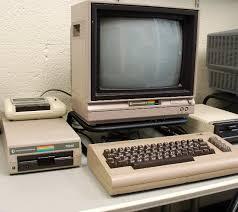 The Commodore 64!
The Commodore 64!It took me a good half hour to get them all loaded, but alas, the payment was that I could use the machine to write my novel during recesses! What? Do you understand my addiction to the clackety keyboard now? Oh, how divine it was typing away and pretending I was a ‘real writer’.
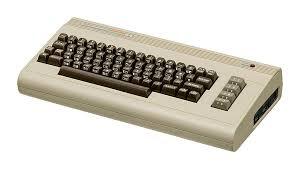 The clackety-keyboard. Yes, please.
The clackety-keyboard. Yes, please.  The floppy disk family!
The floppy disk family! The other part of the deal was that I had to show my fourth grade teacher what I was writing. I put it off for as long as I could…but then I had to show him. I have a vague memory of printing it off on the dot-matrix printer in the lab…
 Remember this?!! Having to rip the dotted edges off and the perforations never worked well!!!
Remember this?!! Having to rip the dotted edges off and the perforations never worked well!!!…and then handing it in to my teacher before lunch recess. When I came back, he called me to his desk, his round cheeks red like forbidden apples. “Vanessa,” he said, “This is very inappropriate writing for someone your age.” Then it was my turn to blush, but there was pride in my apples. “Murder. Smoking. Adults doing adult things…” He wagged the pages at me. “Please don’t leave this out. Take it home.”
I took the pages, giddy inside, because although he reprimanded me, and told me to take the pages home…he didn’t tell me to stop writing. After that, he’d ask me how my story was coming along, and I’d say great…and that was the end of it. I didn’t finish that murder-mystery, complete with a sassy, red-lipped jealous wife and her dead-beat, cheating husband and his lover maid…and the trench-coat wearing, tilted Fedora-headed, hard-boiled male detective whose job it was to solve the case without falling in love with the jealous wife…I hadn’t even read any hard-boiled novels at that point in my reading life!
Looking back, I realize that I was writing then with a freedom…an abandon…a constant surge of joyful release that I’ve been trying to recover…so when I wrote fiendishly all last year in an effort to complete a second draft (after a very thorough outline) of my YA novel, it truly felt outstanding to make my personal deadlines, and have it completed and ready for beta-readers by the end of the year.
I’ve finished three feature-length screenplays, and four (including this current one!) novels (all Young Adult!) at this point in my career. Each time I completed a project I felt elation, exhaustion, excitement…hope. Two of the four novels, I’ve submitted to agents and/or novel contests. I came very close to getting an agent for one of them…but in the end it didn’t work out. But, I have that novel in my back pocket, and I’ll definitely submit it again at some point (after another quick edit!). I used to submit a screenplay to a big contest once a year…but that was when I was in university and convinced I was on my way to Hollywood to work with Tom Cruise.
I believe it is a very special and necessary part of the writing process to acknowledge and celebrate when you’ve competed a major writing project. Be it a whoop-and-whoot in your office followed by dancing a jig or eating a small cake or sleeping for three days straight…it’s an important part of the creative process to acknowledge the greatness of what you’ve achieved. It is a feat to complete a manuscript!
Allow the dreams of what will come to flourish. Envision your novel adapted into an award-winning film starring your favourite actors. (You know you think about this when you’re writing!) Let hope sit on your heart for days after and feel the power of passionate accomplishment. Because, my friend, let me tell you, you’ll need it for the next phase of the process. At this point, the book is wombed in your passion, hope and dreams. Feel that. Love that. Celebrate that!
February 20, 2025
What It Feels Like To Have A Writing Idea
Whether it is a word, a sentence, or a paragraph’s worth of writing, the seed of an idea that blooms into a poem or a narrative is a powerful thing.
I’ve been contemplating ideas…imagination…their connections to each other, to the body, to our internal and external relationships. In essence, I’ve been thinking about how creativity lives and breathes in our daily lives.
Where do ideas come from? Why do they arrive when they arrive? What makes the ‘writer’ have the motivation to take the idea from the floating shape it is in the mind and express it words that make a poem, a song, a story?
For me, this ability was formed in childhood. I spent a lot of time alone, (even though I was often surrounded by others), my state of being was, or should I say, my body in the space, was often singular. I don’t remember a time when I didn’t want to read a book or write an idea down. I don’t remember a time when my brain wasn’t afire with the flames of curiosity, wonder, and hope. It was also filled with fear and worry, but as I move through therapy and learn about coping, shame and my nervous system, I’m beginning to understand the relationships between these emotions, how the lived (and live) in my body, and how that affected my identity as a writer/reader.
I taught myself how to cope with creativity. I taught myself creative ways to cope. Creativity has been a constant partner in my life. I felt belonging in stories – from hard-cover children’s pictures books to early chapter books to full-on novels that I was voraciously reading when I was nine. I still have many of the books I read when I was a child. There was a voice inside that told me to ‘keep’ these books. I have my copy of the Judy Blume novel ‘Forever’ that solidified my desire to want to be a writer. I have this book on my altar and when I look at it I’m zapped back into my 12-year-old body and the feelings it was filled with as I read the book. I have all the Judy Blume books from my childhood as well as countless others that I read over and over, that were friends to me.
I had this stirring in my chest when I read that voiced: I want to do this. I want to write. I want someone to read my books. I didn’t know how I would heed this voice’s call, but I’ve always had the stirring of energy in my centre, this knowing, that writing was for me. Over the years, I’ve called it purpose, identity, spirit…and it is all these definitions and more.
But at the core of my knowing that I want to read, that I want to write, that I want to be doing these things…is the counterpart that is idea-generation. Included in my life-long love of how it feels to read words that evoke and provoke me, is a reactive response that results in an idea…is a lick of flame that shoots from the fire within that holds a word or a line or a holding space for an idea.
I am grateful that my brain…that my body…has this ability. Maybe it seems obvious that I have this ability…that we all do when it comes to the things we want to do, in relation to our purpose, identity, spirit. This is the knowing that leads us into our ‘work’ – whether it’s paid or not – but it is that energy, that voice that leads us in the ‘doing’ directions that express our ideas.
I was talking to a group of first-graders about writing. This is no easy task as a 6-year-old is just beginning her journey of understanding letters, their sounds, and the mind-bending realizations that come with language and definitions. I had to be creative in my ‘entry’ point in their minds and bodies about reading and words. Again, at this point, much of their relationship with ‘reading’ was being read to, was as ‘listener’, was as the one who connects an image to a word to the sounds of the letters in the word. The kids could not sit still. Their experience of everything around them was so profoundly mixing in their bodies and their minds, I could practically see all the sparks of their learning flicking out of them. They were bursting with curiosity, with exhaustion, with hunger, with delight! It was so exciting! I decided to ask them about imagination.
“Can anyone tell me what an imagination is?” I asked. Hands shot up like daffodils in spring. “It’s when you…use your imagination to tell a story!” “It’s your brain.” “It’s silly!”
I followed up with, “Can you tell me where you imagination lives in your body?” This one gave them pause, but not for long. Many put their sticky hands to their heads. “It’s in here, Miss. In my brain.”
“Does it move around, your imagination?” I asked. And then they were squirming, completely unable to sit any longer. “Stand up, then show me where your imagination is your body!” The children bolted upright and pointed to different parts of their bodies, laughing and twirling and jumping.
I think about this phenomenal experience all the time. Witnessing children being children shows/teaches us how ideas live and burst forth. A 6-year-old simply cannot sit still for all the energy and neurons and bursting of ideas that is constantly happening inside them. This is how it feels when I get an idea! Like I’m a child bursting with light. Like I can’t sit still. Like my imagination is zip-zapping throughout my body and it’s startling and hilarious, a delicious mix of awe and heat inside me.
But I am not in a 6-year-old body anymore. Add forty years of living to my vessel, and there is much more weight that the idea has to push through to get me to write it down. I often get a barrage of ideas when I lay down to sleep. It is not easy to fall asleep…and so my mind will grow a farmer that sifts through the thoughts and experiences of the day, and lean down and search for ideas. It will pull them up…a word, a sentence, an emotion, and hold it up for me to see. I don’t force my body to move and write the idea down. I know there are many of you who do this. The habit/skill of keeping something near the bed on which to record your ideas is in tact. For me, I take the idea and I pin it to my eyeball or heart or brain…to some part of me that I beg to remember the next morning. And if I remember, I know it is a good idea, one that I will work with. Then I write it down.
Other times, ideas seem to run at me, clamping on my face like the facehugger in Alien! Or I’ll be doing something physical – vacuuming, exercising, eating – and ideas will come skipping in. The ideas keep coming. And I do my best to hold them, to extend them out of my interior and into the external realm where we can play and indulge and grow together.
What happens with each idea changes. There are many ideas I have that haven’t reached the outside world yet. Some of these ideas I’ve had for years. They’re like recurring dreams…but this gives me comfort because it shows me that this tandem between imagination and expression of ideas is alive and thriving.
I agree that my imagination is in my brain, but I also agree that it moves around. That it wriggles and jiggles and squiggles inside me.
Like love, imagination is something that we all have, and that we all cultivate, that we can give and receive. It shows its form in art, in science, in all the ways that humans create. Even though it does not get an organ…like love is attached to the heart, imagination is still an alive, active part of our bodies. I love all the ways that we’ve ‘imagined’ our imagination into being!
For me, writing is the voice of my imagination and ideas are the grand love language of their expression. I’m sharing this with you as the first in a three-part contemplation about ideas, creating a writing piece based on ideas, and getting those written ideas published.
I want to share what the process feels like for me….inside and out because I believe that my relationship with the process of creativity, with my imagination and ideas it makes, profoundly affects who I am a human being. And this matters to me.
Having shared this, I’d like to also say that writer’s block, a term and an experience that many writers write about and/or feel/experience, is part of the relationship in the body between the imagination and ideas. I believe that a healing gesture to this experience, if you’re experiencing it, is the Pause. Pause. Wait. Shift your attention. Engage in a different creative endeavour. And trust. Trust that the ideas will find their way…wriggling and jiggling and squiggling inside you – once again, onto the page.
 link to artwork by Sam Shennan
link to artwork by Sam ShennanWhere is you imagination right now? What ideas are bursting forth?
February 8, 2025
Inside Second-Hand Books – Always Leave a Gift
I’m a fan of second-hand books. I frequent Goodwill to purchase used books for myself and for friends. Yesterday there was a 50% off sale at one of the Goodwills…so I went and filled up. There’s even a Goodwill Bookstore – all books!
There’s something really special about second-hand books. Firstly, I love the term ‘second-hand’ to begin with! To think that someone else’s hand was holding the book you now hold in yours. To envision where she was reading…what the weather was like…how she turned the pages…how she cared for the story, the characters. I mean, consider how we hold a book. Consider how when we’re nearing the next page, we slip our fingers under the page, in anticipation of the turn. Consider the joy of turning to a new chapter – the relief of less words on the page (!). Consider how we mark the page if we’re into that.I’m a bottom-corner-folder. If there’s a line or paragraph on the page that I adore, I’ll fold the bottom right corner up slightly…so when I revisit the book, I look to those pages for passages that floored me. Books are precious and we treat them that way, don’t we? I’m a spine-cracker, a page-sniffer, an inscription writer.
I love what the pages hold…the energy, the emotions (dried tears, anyone?), crumbs in the center…chocolate fingerprints on an edge…
But a special thing that only happens with purchasing a second-hand book is that sometimes…there are little gifts inside.
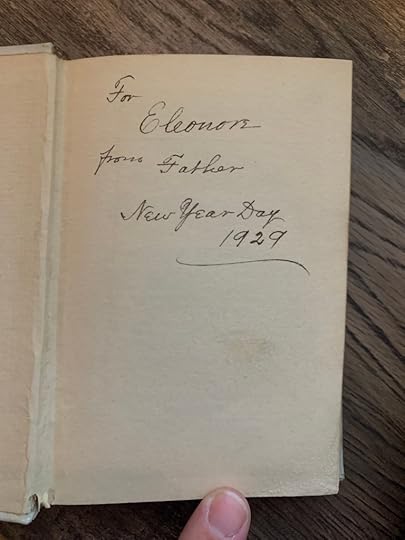
Thank you, Charis, for reminding where I got this Women’s Thoughts for Women book – from you! And for sharing that the inscription was to your great-aunt Eleonore. Amazing!
Inscriptions are so vulnerable. So human. Such an entry into the past of the book. Especially when dates are part of the dedication…and the hand-writing…the swoops and swirls…what is held inside ‘From Father’? What is the relationship between Father and Eleonore? A gift on New Year Day…was it a tradition to give a gift on the first day of the year between these two? Oh, the possibilities of story inside the words is incredible…and offers another layer of relationship with the book.
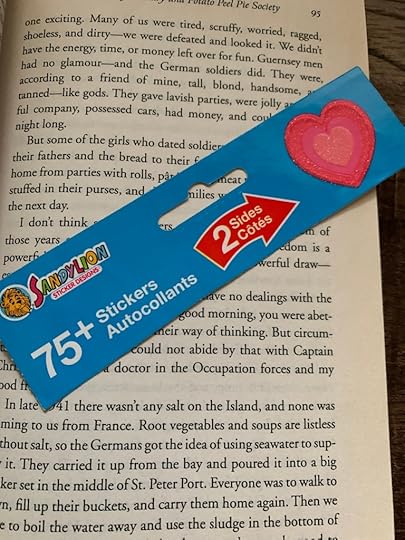
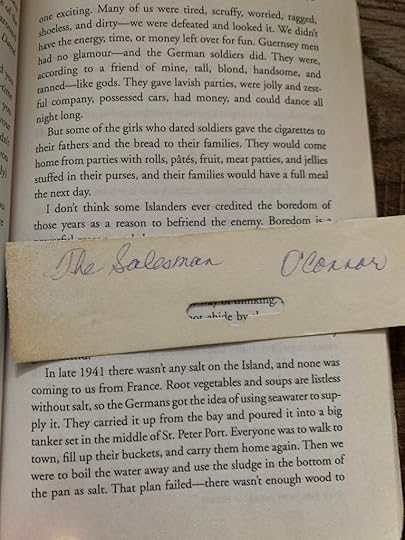
Inside a copy of The Guernsey Literary and Potato Peel Society by Annie Barrows and Mary Ann Shaffer I found an interesting book mark. The top of a sticker pack…perhaps it was a pack of heart stickers? The edges darkened with age…clearly cut with scissors…and not in a straight line. I love the reuseablity of this piece of cardboard. And what is: The Salesman…O’Connor? It is another book! The Salesman by Joseph O’Connor! Incredible…two books in one!
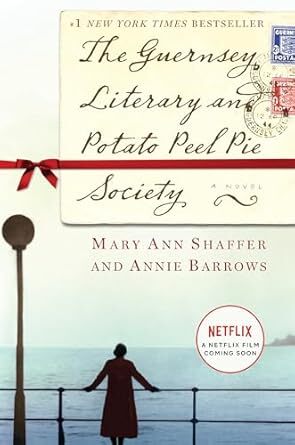
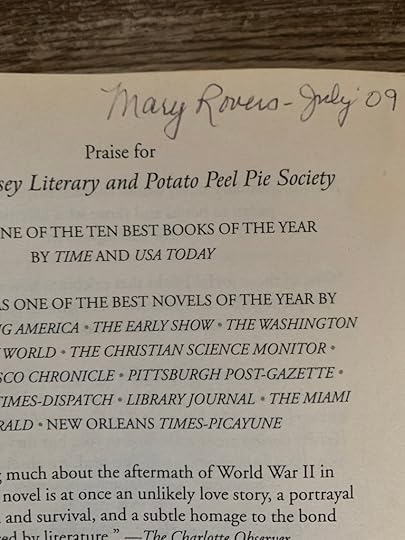
This book belonged to Mary Rovers…and she either read the book or received it or both on July, 2009. The book was released on May 5, 2009…Did Mary like reading new books? Was this a gifted book? Did she purchase it herself? Does Mary love to read? Making a note about another book on her self-made bookmark? Again…the layers of added story in a second-hand book is incredible.
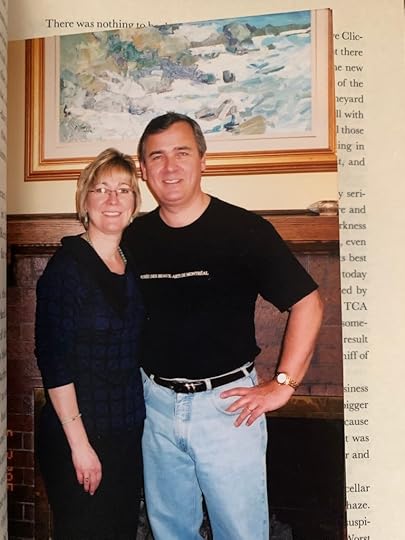
The book is The Widow Clicquot by Tilar J. Mazzeo, and inside, this photo.
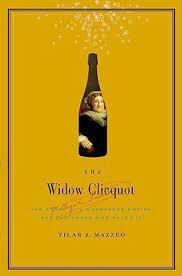
Who are these people? Do they enjoy champagne? Are they siblings? A married couple? Lovers? Friends? Who uses a photo as a bookmark? Who forgets it in the book? Was this book donated after a death and no one looked inside? My mind reels and reels and writes and writes!
I wonder…what if the next time we gave a book away, we included a little gift for the next reader? What would you leave inside?
Second-hand books hold the mysteries of their previous readers. Sometimes, we get the gift of a clue…a crumb, a name, a date, a bookmark. This is something that makes reading second-hand books so extraordinary! Also, I might add – what incredible writing prompts these little treasures are…
Write a story about Mary Rovers on July 1st, 2009. She’s just purchased The Guernsey Literary and Potato Peel Society novel…
Eleonor just received the gift of a book of women’s writing from her father. Write the dialogue exchanged between as he gifts her the book…
I’ve found so many treasures inside second hand books…from photos to library cards to receipts…what kinds of gems have you found in second-hand books?
February 7, 2025
On Mandatory Suffering
I’ve been contemplating suffering.
I’ve been suffering pain in my body chronically for decades…my autoimmune system (has two diseases!) on high-alert for as long as I can remember…and more recently, a lower-back issue that’s been on-and-off since 2022.
The term ‘comparative suffering’ has been bopping around between my parts for years now too. I don’t want to go to the interwebs on this one…to discover who coined the term and what it means, as I’m sure my brain is not the first to put these two words together. I don’t know if I read it or if I heard it or if what it means to me has been enough to keep it germinating for some time now.
Does this happen to you? You feel something…you hear something…you go through something that excites and encompasses your body and mind…and then you notice a word or meet a person or, in some way, discover tangible signs about this thing you’re feeling or hearing? One can attribute all kinds of motivations for these occurrences…but it happens to me all.the.time. And it’s like, I can’t let it go or let it not affect my mind and body in such a big way, until I gather all the signs and pay attention to them…and discover what I can learn from them.
For me, suffering is a teacher. A strict, strident, stiff being who lives in the body that is my classroom. When I envision it – it is gendered. It is a she. I can see her body…she has dark hair pulled into a bun so tightly wrapped at the back of her head, her skin is translucent. She doesn’t have a face.
I’ve made contact with her during therapy sessions…while writing poetry…or entries in my journal. She is busy right now, and she’s called in her siblings, cousins, her whole damn family, to knock the knuckles of our heart hands with her cold, metal ruler. Suffering wants to be in all the classrooms, knocking all the hearts, and usurping the body to bend and buckle into the trickery of believing that the darkness is painful, bad, and stronger than the light.
Now, okay, this is all very metaphorical…and perhaps my penchant for poetry is pushing its way into the language…I will let it. Because, poetry is a mirror for suffering. The chalkboard, if I take hold of the classroom that is my body, I can change into a mirror.
I had a vision, led by my dear friend and wise-sister Erinn (thank you, sister!), and I was zoomed back into my childhood bedroom, complete with bunkbeds, dresser and small wooden table (with two chairs, and a sweet but scratched illustration of lambs in a flower field on the top) in their places. Also, my self, aged 4-years-old. She was alone, sitting on one of the chairs. I (my grown-up self) took a seat on the bottom bunk. Little Me looked at Grown-up Me. We stared at each other. She said: This, our suffering, is mandatory.
I listened as my brain exploded taking in her words. And our teacher, Ms. Suffering, did a slow, sarcastic clap as she strutted alive in my body.
Little Me also said: You are the mother you always wanted.
That one turned my brain into stardust. I wept in real-life and in the vision. Ms. Suffering shrunk, and spider crawled into a hiding place.
I had this vision about two weeks ago and it plays in my movie-mind on repeat.
This, our suffering, is mandatory. You are the mother you always wanted.
This morning, this showed up, when I did a card pull requesting guidance on how to quell my fear about the world – politics, economy, environment…
 Divine Feminine Oracle Deck
Divine Feminine Oracle Deck
“The dark has been so vilified yet, all life emerges from the pitch-black womb. The darkness is potential; it is the crucial and elemental stage we must all go through to create new or more life…The body has wisdom. The earth has wisdom. And the pain we experience as humans contains deep wisdom….It can be almost impossible to accept or notice the presence of the divine when we are at our most human…There is no darkness we can enter without being met by love…”
Meggan Watterson, with illustrations by Lisbeth Cheever-Gessaman
Being human…being alive in energy that flows in a body…that energy of bone and muscle and cells, wrapped in skin so strong it has seven damn layers, an organ that is in constant holding of all that our bodies are made of…if, as John O’Donohue writes…”the body is in the soul”…then what is suffering? It is not a bone or a muscle or a cell. It is not an organ. Is it a dis-ease? An emotional response to trying to get back to our soul energy – without a body?
This is what I’ve been extremely curious about.
This curiosity is penetrating my creativity. It is expressing itself in my poetry and journals and here, with you, and I don’t want to be afraid to share it…because, I think, that’s what Ms. Suffering wants. She wants to alienate, to isolate, to exacerbate the body from the soul through pain…or disagreement or blame or comparing…
I think it’s dangerous to compare our suffering. I think comparing is a dis-ease of the body’s desire to stay connected to its soul. I think the soul is love. I think that love is equal light and dark…and in this way, there is a relationship between dark and light…between suffering and joy. I think that both are inevitable in human bodies. But to hold up pain and call it anything other than a way into the light, than a way back to love…is where we get stuck in our body…is how we forget…what we are… I think it is entirely, utterly difficult to remember this…because when we are ‘most human’ – that is, when we are really suffering…how can we ‘be’ anything else? We are consumed with trying not to continue suffering – at all costs. Internal costs. External costs. Spiritual costs. We forget what it’s like to be in our mother’s wombs. That is the grand forgetting…but the body, the cells, they remember.
I think it’s dangerous to compare our suffering, to gage it as ‘worse than’ another’s…because measuring one pain against another is defying the fact that each IS in pain, that each IS suffering. No matter how far I follow this conversation about suffering with all my parts…all the way down…I go, I go, I go…I find my ‘self’ – a singular united collective – in Love’s den.
If we all suffer, and suffering is a teacher, and each body suffers by virtue of be-ing human…and suffering is dark…and there is equal light to dark…and out of darkness is light…and light is love…the spiral dervishes into love again and again. And this is not a belief in the negation of pain, that diseases are not real, that the lived experiences of a body as ‘able’ or ‘disable’ is untrue – no! All of this is true. I am a living body that experiences suffering and pain on a daily basis…and if not exact pain, then the fear of it lighting up…which can be as terrifying and debilitating.
What I’m swirling inside of is what is suffering? How does it exist in my body and mind? How does it exist in the world around me? In other bodies around me? Do we all have a Ms. Suffering as one of our parts? How can suffering be massive as in a war where thousands of humans die each day, as in epidemics and pandemics, as in the kind of language cruelty that is emotional and verbal abuse, as in racism, as in hate? How can suffering be so small as in a part of DNA, as in a cell, as in the silence of betrayal, as in a lie…? What is suffering if not a mandatory part of be-ing human that my 4-year-old self was able to articulate…and choose, and that, as a result, my grown-up self is something my little self suffered into being…? The mother I always wanted to have…I mean, I can’t write this without weeping at the impact this singe sentence has on the make-up of who I am. It has…re-arranged me.
I’m in the middle of recognizing what it means to acknowledge the Ms. Suffering in my mind, her relationship to my body, and how I can choose to respond to it now…as an adult. As a human who can see and feel and contemplate the ‘mandatory’-ness of suffering…or the freedom of it as it relates to love.
What does any of this have to do with writing?
I think that…it has been through my love of reading and my passion for writing that any of this contemplation is possible. My littlest self loved to read and write. My story, the one I keep writing and poem-ing, over and over, is about love. Does any love story exist without some kind of pain or suffering? I think…yes…but that is the First Story. The Soul Story. And…at this point in my body…in my writing life…these two forces are calling out to each other. They are meeting in the reds of my spasming guts. They are meeting in the tightening of my lower back muscles. They are meeting in my peri-menopausal belly. They are meeting on the page, on the screen, in therapy, in my dreams…I cannot escape…and I don’t want to…this mandatory exchange between suffering and joy.
And it relates to being published or not. A rejection can be painful. And I’ve felt the pain of it over and over. But I’m learning to feel rejection differently. I’m learning to love more deeply the process of the writing, the courage to submit…and the new narrative that a rejection is a surrender…and a surrender is a chance to begin again.
I’m eager to continue discovering the new narrative that my 4-year-old self and my grown-up self can have a re-arranged, a re-imagined, a re-vised relationship with suffering. That perhaps it’s possible to surrender the suffering for my 4-year-old self, in that bedroom, on that day…that she can release the story of suffering she thought was ‘mandatory’…and simply go outside and play. And read. And write. And love.
February 6, 2025
Year of Reading Books – A Dream
“I read slowly, savoring each book one by one. I had all the time in the world then. And there was no danger I’d run out of books, no matter how much I read…”
from Days at the Morisaki Bookshop by Satoshi Yagisawa, translated by Eric Ozawa
This morning I was reading. I was reading because it’s the thing I most wanted to do. I was feeling…tired and my brain was a bit mushy trying to think about what fine blog posts I could offer you, my friends. So I picked up one of the books I’m reading. This lovely little nugget of a book that I found at The Strand Bookstore in Manhattan when I was last there in December, entitled Days at the Morisaki Bookshop. (OH! I just found out that there’s a part two…More Days at the Morisaki Bookshop!!!)
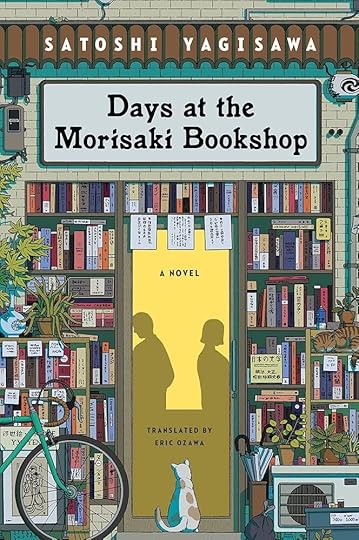
I read about five pages and was so filled up and inspired, I stopped and came into my office to write this post! I love when this happens…when the magic of literature wraps me up and reminds me why I’m a writer, why I’m a reader, and what dreams of mine are wrapped in books. I’d also found the quote that inspired this post! Thank you, Yagisawa!
It’s been a dream of mine to take one entire year and just read books that are in my house. No buying new books (which I’ve done many times…), but reading books that I already have. And there are many, many books that I have on my shelves…Books like Freewater by Amina Luqman-Dawson, like Moments of Being by Virginia Woolf, like 33 things every girl should know about women’s history edited by Tonya Bolden…and this little treasure of a book…Women’s Thoughts for Women arranged by Rose Porter.
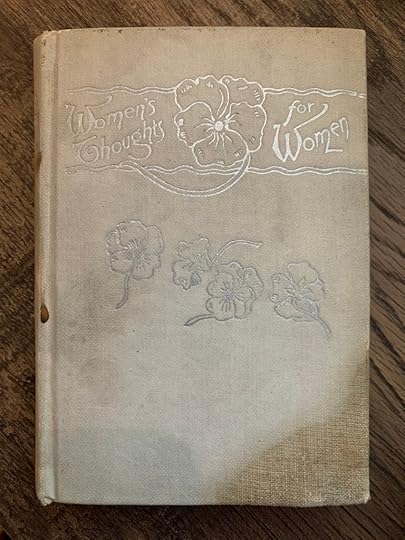
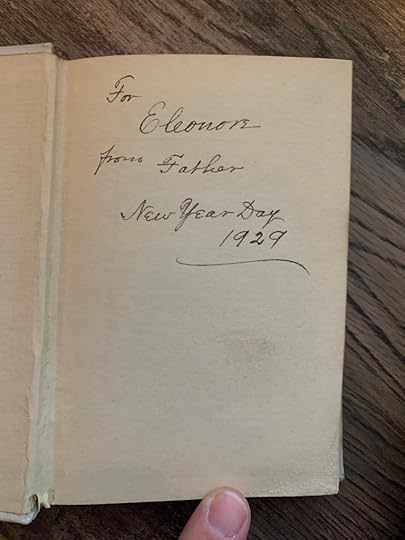
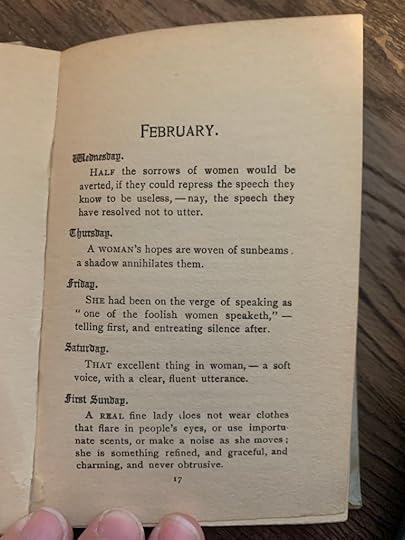
I found this book…well, I can’t remember where I found it, but my goodness…isn’t it a gem?
” A real fine lady does not wear clothes that flare in people’s eyes, or use importunate scents, or make a noise as she moves; she is something refined, and graceful, and charming, and never obtrusive…”
First Sunday – Women’s Thoughts for Women chosen and arranged by Rose Porter, David. C. Cook Publishing Company, Elgin, Illinois, (C) 1891
I’m both appalled and humbled by this quote…by all the words of (so-called…interesting, historical, cultural….questionable!) wisdom in the pages…Quotes from famous women, set to the different months of the year, include Elizabeth Barrett Browning, George Eliot, Charlotte Bronte, Jean Ingelow, and Christina Rossetti. And this little ditty…Look – a companion book for men! This book, also compiled by Rose Porter, is jam-packed with all male figures/writers.
And who, pray-tell is Rose Porter? Wikipedia knows!
Rose Porter (December 6, 1845 – September 10, 1906) was an American religious novelist who wrote or edited more than 70 books. Porter was born in New York, New York, December 6, 1845. Her father, David Collins Porter, was a wealthy New Yorker. He died in 1845, while Rose was an infant. Her mother, Rose Anne Hardy, was the daughter of an English army officer. Porter’s early years were spent in New York and in the family’s summer home in Catskills-on-the-Hudson. She was educated in New York, with the exception of a year abroad. After completing her education, she and her mother made their home in New Haven, Connecticut. After the mother died, Porter kept her home in New Haven, where she lived with her servants. Porter’s first success was Summer Drift-Wood for the Winter Fire (1870). Notwithstanding the fact that she was an invalid for years, Porter was a writer of quiet religious romance, publishing or editing 70 volumes. She also wrote or edited prayer books, devotional exercises, and compilations of material for calendars and diaries. Rose Porter died in New Haven, Connecticut, September 10, 1906.
Interesting – that her father was also the publisher of the two books I’ve mentioned here…and perhaps more? Even though he passed when she was an infant, his publishing company continued on? A quick interwebs search and BOOM – this publishing company STILL EXISTS! David C. Cook is a thriving Christian publishing company!
From their website: Our Founder’s Life-Changing Legacy: In 1875, David Caleb Cook began publishing pamphlets of lessons and songs that equipped local churches for ministry to children displaced by the Great Chicago Fire. Generations later, we’re passionate about God’s work in and through local churches everywhere, engaging all ages along a journey of lifetime faith.
Well, I’ll be! Look at this incredible bundle of information we’ve discovered together simply by me choosing a book off a shelf in my office. This is why dedicating a year to only reading books would clearly include following any sleuthical (new work alert) stirrings, and would be a dreamy, intensive, educational, emotional endeavour.
That said, to clarify, a year of reading books would include writing about the experience, the books, and whatever else bursts forth. It would mean that my creative writing would be bound to the books I’d be reading. It’s a fat, juicy dream…and one that I don’t think I’m quite ready to live yet. But…it’s there, alive and well and waiting.
Do you have a dream like this too? I know many folks who when they retire, they read ferociously. I also know people who work full-time and manage to read a book a week…or more. Reading truly shifts our body and mind’s perception of time. And Yagisawa is right when he writes there is no danger of running out of books…to read or listen to.
One thing that is significant about reading books ‘on my shelves’ (or the floor, or the bedside table…) is that there are books that I’ve always wanted to read, but for some reason (many reasons!), I haven’t. These include those books that I scoop up at second-hand stores; the ‘classics’ that a part of me purchased because it believed it would make me look smarter for having them on my shelves…Take for example, The Dubliners by James Joyce. I’ve had this book on my shelf for years…maybe decades? Recently, whilst watching a film at WIFF, entitled The Room Next Door (the new film by starring Julienne Moore and Tilda Swinton), Swinton’s character kept quoting this passage from a short story written by Joyce called ‘The Dead’. I looked on my shelf…and low and behold, there waved The Dubliners. I picked it up, opened it, realized it was a short story collection (!), and in fact, the final story in the collection was ‘The Dead’! I promptly read it…falling into its richness…its humanity…its shadows and secrets. Damn. I’d never read James Joyce before. And now…I feel enriched having his voice in my heart centre…seeping into my bloodstream like a good virus. And…the magic of books – how they know exactly what we need from them…how they teach and support and challenge us…is as alive as any living thing! Trusting in the magic for an entire year…whoa, mama. That’d be something.
This is why I dream about a year of reading books…writing about reading books, writing about books…and fattening my mind and body and spirit on the gifts that each writer, each story would deliver.
January 24, 2025
What If Agents Queried Writers?

In my cheekiest moments whilst thinking about the traditional publishing world, I often think about what things would be like for writers if certain parts of the process got flipped.
For example, what if agents queried writers? What if we had a gargantuan place where we could put information about our writing lives, share our publishing history, include direct links to the manuscripts we’d like to get published…oh hold on…I think maybe…is that like, an internet?
What if there was a way we could direct agents to what we’d like to get published so they can get a taste of what we do, who we are, and what we’re dreaming about for our publication lives – and the agents query us!
We could create google form, as many of the agents these days have done, or we could all agree on the format of an agent-to-writer query…perhaps something that would go a little something like this:
Dear Writer*,
FIRST PARAGRAPH: In one-to-three sentences, tell us what kind of agent you are (what genre(s) you represent), how many authors you currently represent, how many books you’ve ‘sold’, and what makes you different than all the other agents out there.
SECOND PARAGRAPH: In three-to-five sentences, tell me why my manuscript is so amazing, what Big Five acquiring editors would be interested, the amount of the book advance you think you could get me, and how our working relationship will play out.
THIRD PARAGRAPH: In three-to-four sentences tell me something unique and exciting about you – personally. Please include books you’ve read that compare to what I’ve written – and why you think my story is marketable. Really pitch me on who you are so that, if I’ve made it this far into the query, these final bits of dazzling you will make me fall in love and want to respond.
End with a witty yet humble signature,
Your name**
*Show that you’ve done your homework – is there something you’ve learned about me that you can put into the salutation with my name? Example: Dear Vanessa, swimming goddess and lover of chocolate…Be sure to not make it too shmaltzy though.
**Include your actual signature not just your typed out name
There would be guidelines for you to acknowledge from the writer as well. Including but not limited to:
a) It could take up to 8 months for a response. If you do not get a response within that time, then that means the writer is not interested. Only digital queries will be accepted.
b) Not every writer will accept simultaneously querying agents.
c) Please do not use your voice for any kind of contact, and do not ‘follow-up’: no phone calls, voice mails, text messages, or follow-up emails. The writer will contact you if the writer is interested.
d) Please include your query in the body of the email. Do not include any attachments: example: photos, art, any form of attachable ‘pleas’ for the writer to choose you.
It would go without needing to be said that this query will very likely be read on a cell phone whilst in transit, and will be one of many. So, if that opening salutation and first paragraph doesn’t grab the writer…
If the agent is extra curious about the writer, they could attend a writing workshop and/or a conference where they could pay to meet with the writer for a maximum of 12 minutes to ‘pitch’ themselves. But it should be noted that each agent who pitches the same writer will most likely receive the complete opposite feedback on their query.
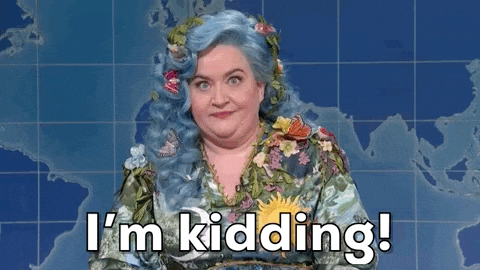
Is this too cheeky? I’m simply trying to poke some fun at the challenges/frustrations writers feel when querying agents. I understand that each agent is different, with different goals and interests, with different spots to fill in their roster…and lots and lots of work to do.
I think we can all agree that whether we’re an agent or a writer, what we do have in common is that we all work our hineys off. We are all, in fact, over-worked, underpaid, and a little broken-hearted at the fact that there are so many damn amazing stories and so little time to read and love them.
Oh, and sometimes, I think a version of agents-querying-writers does happen. I’ve heard of writers being contacted because an editorial assistant or intern found the writer on a writing platform like Wattpad or Amazon or Tiktok. It isn’t impossible to be sought out by an agent.
And it isn’t impossible to break the rules and sleuth your way to speak to an agent. Like, actually on the phone with your voice. I did it. Once. Funny but true story. I did some serious searching on-line to try and contact an agent in New York. I managed to get a number to the building…and then to a receptionist…and then directly to the agent. He was very surprised that I’d made it to him. He said, and I quote: “You’ve got balls.” And then he asked me about my query and my email, he read it in real-time, said it wasn’t for him, but good luck. He said he hoped I’d “find a home for it.” (Yeah, it’s called my home. My house. The manuscript did not find an agent or a publisher. Yet.It was a very exciting exercise for me, and one that I haven’t been able to recreate.
There are ways around the Excruciatingly Long (Possible) Response time of agents. Seek them out at conferences or workshops. You’ll likely have to pay to see them, but you’ll get a chance to see them, talk to them, and pitch your story. Of course, the other way is to write something that they want to represent. And to write a kick-ass query letter that lights them up.


